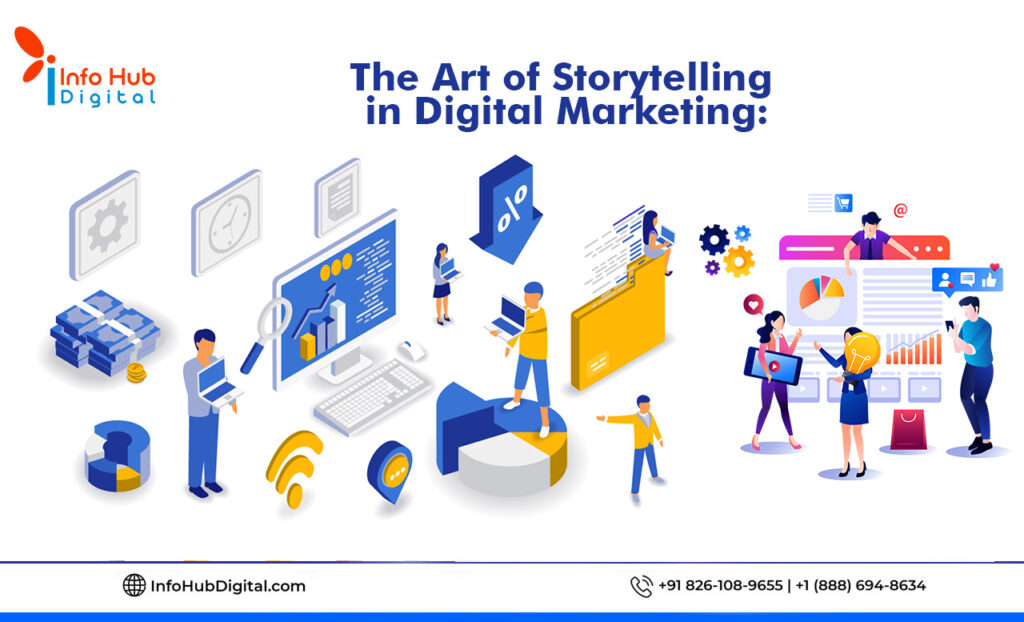Table of Contents
Introduction
In the fast-paced realm of digital marketing, where attention is scarce and competition fierce, the art of storytelling has emerged as a potent tool to captivate audiences. This article explores the profound impact of storytelling in the digital age and how it has evolved to become an essential strategy for marketers.
The Fundamentals of Digital Storytelling
Understanding the Essence of Storytelling
At its core, storytelling taps into the very psychology of human nature. It goes beyond mere information dissemination, aiming to forge emotional connections with the audience. By understanding the innate human desire for narrative, marketers can harness storytelling as a persuasive force.
Key Elements of a Compelling Digital Narrative
Successful digital narratives hinge on several key elements. Characters, for instance, act as vessels for relatability and empathy. When audiences can connect with characters on a personal level, a deeper bond is formed. Meanwhile, crafting immersive settings akin to building brand universes ensures contextual relevance and engagement. The plot, driven by conflict and problem-solving dynamics, keeps the audience invested.
Personalization and Audience Engagement
Tailoring Narratives to Your Audience
In the digital marketing landscape, one-size-fits-all approaches are no longer effective. Personalization reigns supreme, and segmentation is the compass. By tailoring narratives to specific audience segments, brands can address unique pain points and aspirations, fostering a sense of resonance and connection. Additionally, user-generated content adds an authentic touch to storytelling.
Interactive Storytelling Experiences
Interactivity transforms storytelling into a dynamic dialogue. Engaging the audience through quizzes and polls not only invites participation but also deepens their investment in the narrative. Allowing users to influence plot outcomes grants them a sense of ownership over the story, making it a shared experience.
Crafting Multichannel Narratives
Consistency Across Digital Platforms
In an age of multichannel marketing, maintaining a unified brand voice across various platforms is crucial. This consistency ensures that the narrative remains coherent and recognizable. Simultaneously, adapting stories to suit different mediums maximizes their impact, acknowledging the unique attributes of each channel.
The Visual Power of Storytelling
Visual storytelling, through videos, imagery, and infographics, holds immense sway in the digital realm. It enhances engagement by appealing to the visual senses, complementing the narrative with striking visuals. Infographics, in particular, distill complex information into easily digestible visuals, making them indispensable in conveying key messages.
Storytelling in Content Marketing
From Blog Posts to Narratives
Content marketing is inherently intertwined with storytelling. Transforming traditional blog posts into narratives elevates their appeal. By infusing educational elements into these narratives, brands can inform their audience while also addressing their pain points in a creative and engaging manner.
Case Studies as Success Stories
Real-life applications of products or services are potent storytelling tools. Case studies present success stories that demonstrate the practical value of what a brand offers. They serve not only as testimonials but also as trust-building tools, showcasing transparency in action.
Measuring the Impact of Digital Storytelling
Defining Success Metrics
To gauge the effectiveness of digital storytelling, it’s imperative to define success metrics beyond mere click-through rates. Emotionally resonant storytelling can be assessed by analyzing engagement metrics and conversion rates, providing a more holistic view of its impact.
A/B Testing Narratives
Understanding audience preferences is an ongoing process. A/B testing allows marketers to experiment with different narratives and determine which resonates most with their target audience. This data-driven approach empowers brands to refine their storytelling strategy for optimal results.
Adapting Stories to Trends and Changes
Navigating Cultural Shifts
Storytelling must adapt to evolving cultural landscapes. Staying relevant and sensitive to cultural shifts is crucial to avoid alienating or offending the audience. A keen awareness of social and political context helps brands navigate these changes gracefully.
Storytelling in the Era of AI
As artificial intelligence plays a growing role in marketing, maintaining authenticity in automated narratives is a challenge. However, AI also opens doors to personalized, data-driven storytelling experiences. The future of AI-assisted storytelling promises to be a dynamic blend of technology and human creativity.
Conclusion
In conclusion, at Info Hub Digital, we’ve explored the transformative power of storytelling in digital marketing. As a leading digital marketing services provider in India and the USA, we recognize the importance of crafting compelling narratives to connect with your audience.
Our team specializes in leveraging the art of storytelling to enhance your brand’s online presence. Discover the difference with Info Hub Digital, your partner in creating engaging, personalized, and effective digital marketing strategies. Join hands with the best social media marketing services provider company in India to elevate your brand’s story and reach new heights of success.







